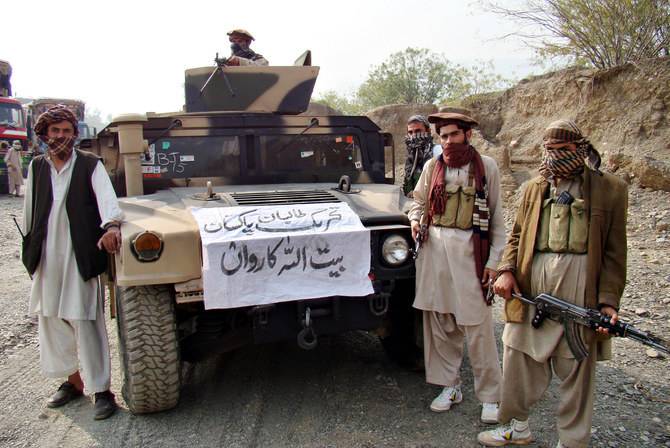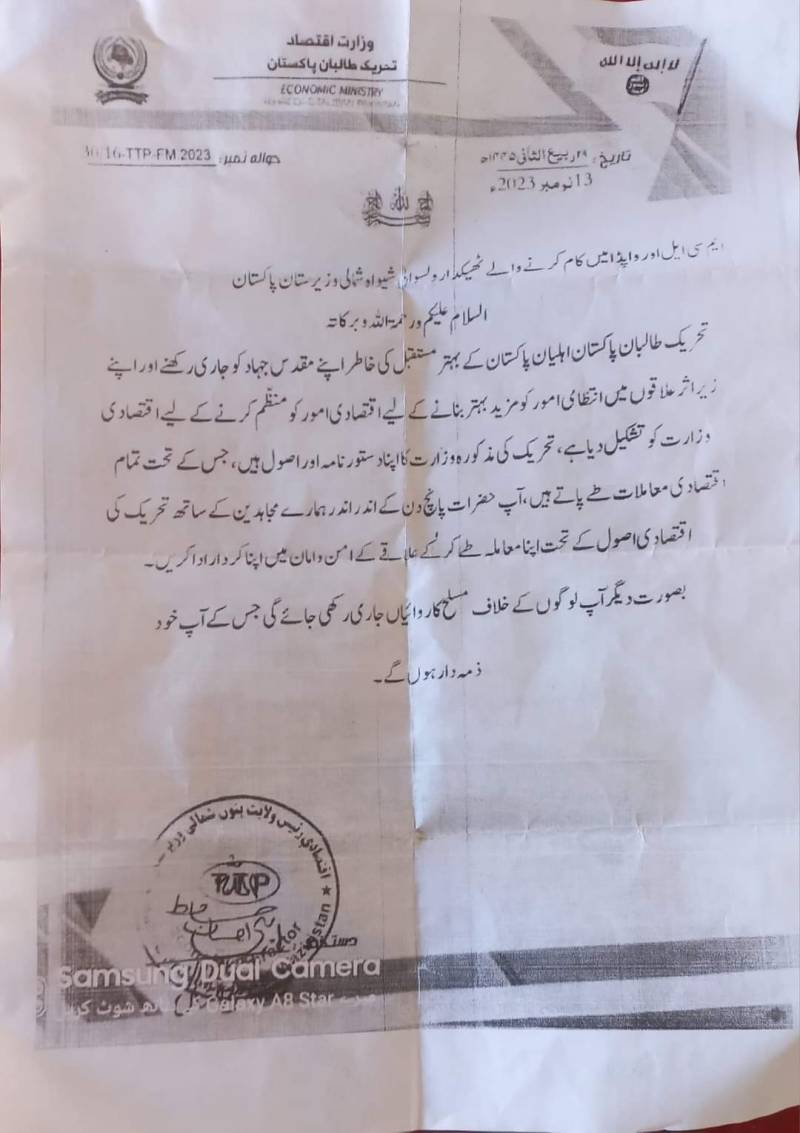
Exploiting the administrative vacuum in the Newly Merged and settled districts of Khyber Pakhtunkhwa, the Tehreek-i-Taliban Pakistan (TTP) has erected its clandestine administrative apparatus, encompassing departments ranging from justice to war ministries. In the latest development, the TTP has issued a directive to contractors affiliated with WAPDA and Mari Petroleum Company Limited through a pamphlet. The directive informs them of the establishment of a new Ministry of Economic Affairs by the TTP and urges them to engage in discussions with its officials to reach a comprehensive understanding.

This directive encourages them to initiate discussions with officials from TTP's Ministry of Economic Affairs. The primary goal is to foster a mutual understanding regarding the most effective operation of their businesses within District North Waziristan.
The pamphlet, issued on November 13, conveys a message centered around the betterment of the future for the people of Pakistan. It emphasizes the continuation of the sacred duty of Jihad and the enhancement of administration in areas under Taliban influence. The TTP has established the Ministry of Economic Affairs for this purpose, equipped with its own set of rules and regulations governing all economic affairs. Contractors are explicitly instructed to play their role for peace in the area and engage in discussions with designated mujahideen, seeking a collaborative understanding within the framework of these regulations. However, the pamphlet also underscores a warning: failure to comply may result in violent actions being taken against the contractors, for which they will bear sole responsibility.
This situation is undeniably perilous, given that taxation is an inherent responsibility of a government. If the TTP is levying taxes on government departments, business leaders, and the general populace, it not only undermines the authority of the state, but also establishes a hazardous precedent. The act of non-state entities engaging in taxation poses a significant threat to the established order, potentially eroding the fundamental principles of governance and paving the way for chaotic and unpredictable fiscal practices outside the framework of legitimate governance.
The prevalence of extortion in KP has reached alarming levels, prompting the police to establish a dedicated helpline.
Reliable sources have informed TFT that the TTP has strategically established clandestine departments in each administrative division of KP. These covert entities not only engage in the extortion of business communities and affluent individuals but also involve themselves in the resolution of disputes among the general populace. Given the perceived shortcomings of both the judicial system and local administrations in addressing even the most minor disputes among the common populace, individuals have increasingly turned to the TTP-established structures for the resolution of their grievances. It has come to light that local clerics, ostensibly affiliated with specific religious parties, are leveraging their influence from these shadow departments orchestrated by the TTP.
The prevalence of extortion in KP has reached alarming levels, prompting the police to establish a dedicated helpline. This initiative encourages individuals to promptly report incidents of extortion to the Counter Terrorism Department of the police. The urgency behind this effort stems from the realization that funds generated through extortion are being channeled into supporting terrorist activities.
Despite assurances from the police, the public remains skeptical, as individuals find themselves compelled to succumb to extortion demands or face the prospect of closure or relocation to other provinces. In recent months, incidents of extortion calls and threats have witnessed a significant surge. Shockingly, some factory owners recount instances of grenades being hurled into their homes when they resisted paying extortion money.
A business who preferred to remain anonymous, expressed his dilemma. His factory, which sustains the livelihoods of approximately 150 families, has become a target. In an already challenging business environment, the incessant demands for exorbitant sums of money as extortion have exacerbated the situation. Despite multiple complaints and pleas for protection lodged by his representatives, the response from law enforcement has been limited to verbal assurances during meetings over tea at police offices. Frustrated and concerned, the businessman has no idea how this situation will develop: "What am I supposed to do when threats and calls persist, and our livelihoods are at stake?"
In recent months, their business has encountered a troubling issue – extortion calls originating from Afghanistan numbers on WhatsApp.
A government contractor shared a harrowing account where they managed to secure a competitive contract in NMDs a few months ago. Upon mobilizing machinery and labor to initiate the project, the contractor began receiving extortion calls, demanding "bhatta." Despite bringing this issue to the attention of the authorities, the contractor received no support. One night, the site was violently attacked, resulting in the destruction of construction equipment. Consequently, the labor force dispersed, and the contractor was compelled to abandon the contract, incurring substantial financial losses from both the initial investment and the damage to machinery.
A wholesaler dealing in food items from South Khyber Pakhtunkhwa (KP) shared with me the challenges faced by their family business. Started by their father, the business primarily supplies essentials such as flour, cooking oil, and pulses. However, in recent months, their business has encountered a troubling issue – extortion calls originating from Afghanistan numbers on WhatsApp.
Initially, the business chose to overlook these demands, but the situation escalated when their delivery vehicles were intercepted, and the delivery personnel were subjected to threats of severe consequences. This led to a significant number of drivers refusing to venture into specific areas.
When questioned about the assistance from the police, the wholesaler expressed a grim reality: "Poor policemen can't even protect themselves in these areas, given the daily attacks they face. What can they do to protect us?" Faced with limited alternatives, the business reluctantly resorted to making payments, sometimes in cash and other times in kind. The question lingers, "What other option do we have?"
There is an urgent need to prioritize the provision of infrastructure in areas like the NMDs to ensure swift resolution of disputes, particularly for the benefit of the local population.
The justice department of the TTP has taken on the role of a mediator among the residents of the newly merged districts, capitalizing on the vulnerabilities within the government's administrative structure or the absence thereof. I have consistently emphasized the significance of addressing this critical issue through my articles that the integration of the people from the NMDs is imperative, and their grievances must be earnestly addressed. Failing to do so not only risks creating a breeding ground for entities like the TTP but also opens the door for the emergence of other similar entities. It is essential to prioritize the inclusion and resolution of concerns in these regions to prevent the exploitation of administrative weaknesses by non-state actors.
The Army Chief made it clear at a recent interaction with Islamic scholars at General Headquarters Rawalpindi that “Pakistan belongs to all Pakistanis without any religious, provincial, tribal, linguistic, ethnic, sectarian or any other distinction. Use of force and armed action by any militia, entity or group other than state is unacceptable.”
While it is encouraging to hear the statements from the Army Chief, the ground reality remains quite grim. The government must earnestly focus on implementing the already developed National Action Plan to effectively address the menace of militancy. Additionally, there is an urgent need to prioritize the provision of infrastructure in areas like the NMDs to ensure swift resolution of disputes, particularly for the benefit of the local population.

